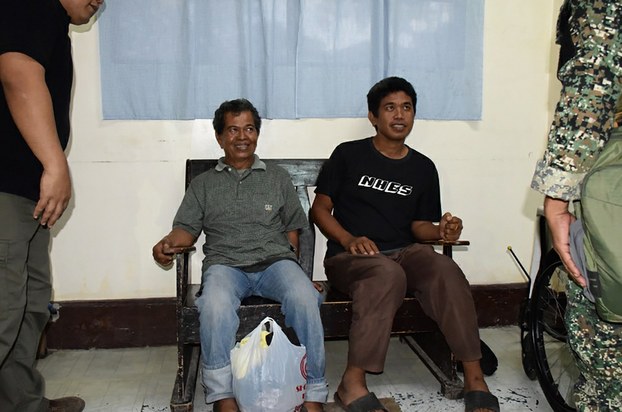Philippine Military: Doing ‘Best’ to Free Abu Sayyaf Hostages

ndonesian nationals and former hostages Mohammad Nazer (left) and Robin Peter are shown at a hospital in Zamboanga, southern Philippines, after their release from Abu Sayyaf militant custody, Dec. 12, 2016.
The Philippine military vowed Thursday to rescue all hostages in Abu Sayyaf militant custody, while Indonesian and Malaysian officials said they were working with Filipino counterparts to free sailors from their countries who were abducted at sea in December near the southern Philippines.
Col. Gerry Besana, spokesman for the Western Mindanao Command in southern Zamboanga city, dismissed as propaganda a claim by the Abu Sayyaf Group that the three hostages seized two months ago had been taken to Jolo Island, which is part of a Philippine chain that lies off eastern Malaysia’s Sabah state.
“On our side, we will not negotiate with the terrorists. We strictly follow the government’s no ransom policy,” Besana said, vowing that a “relentless” pursuit operations would continue. “We are doing our best for the possible rescue of the hostages.”
A video released on social media last week by Abu Sayyaf showed two Indonesian hostages kneeling before their captors. The bandits were seen threatening to behead the hostages.
Philippine military intelligence officials told BenarNews they believed the three hostages were taken to a location somewhere in the south, but they declined to be more specific.
Those shown in the footage were identified as Indonesians Heri Ardiansyah, 19, and Hariadin, 45, while a third, identified as Malaysian Jari Abdulla, 24, was not shown on video, according to sources in Philippine military intelligence.
Fitri Amelia, the relative of one of the Indonesian hostages, said she had seen the video on Facebook. The footage showed her uncle, Hariadin, and his compatriot, Heri Ardiansyah, both blindfolded with their hands tied while a man held a machete as if ready to slit Hariadin’s throat, she said.
“I recognized his voice and the tattoo on his body,” Fitri told BenarNews on Thursday, referring to her uncle.
It was not clear where the footage was taken or when, only that the gunmen identified themselves as members of the Abu Sayyaf Group.
“I have been caught by Abu Sayyaf of the Philippines in the Sandakan Sea. I appeal for the attention of the Indonesian government, especially Mr. President,” Hariadin, 46, was heard saying in the video.
Fitri said Hariadin’s family had been told by a representative of the Foreign Ministry who visited his wife that the abductors were asking for 10 billion rupiah (U.S. $710,000) in ransom.
“We don’t have that much money. We are a farming family and we have nothing,” Fitri said. Both of the Indonesian hostages are from Sulawesi Island.
The three victims were reported as missing Dec. 6 in the Pegasus Reef area in eastern Sabah waters, after their boat was discovered with its engine running. An investigation showed that the trio was seized by seven gunmen who allegedly sped toward the direction of Sulu, sources said.
The Abu Sayyaf group is believed to be holding eight other captives, including a Dutch national, a Vietnamese, a Malaysian, two Indonesians, and three Filipinos, in Jolo.
In related developments, an ongoing military offensive targeting Abu Sayyaf positions in the jungles of Patikul on Jolo Island left two gunmen dead and two others wounded on Thursday, Philippine officials said. Last week, a soldier and four militants died in heavy fighting near the area.
Besana said the ongoing operation was aimed at rescuing all of the hostages, weeks after foreign militants working with the Abu Sayyaf allegedly set off bombs that killed 23 people at a church in Jolo town.
‘We’re not abandoning them’
In Jakarta, the Indonesian government confirmed that the two Indonesian sailors and Malaysian seaman were abducted from their fishing boat, which was sailing in Sabah area waters, in early December.
“We continue to communicate with the families and coordinate with parties in Malaysia and the Philippines in our efforts to free the Indonesian citizens,” Indonesian Foreign Ministry spokesman Arrmanatha Nasir told reporters.
Indonesian officials confirmed the December maritime abduction after news reports circulated about the new video released on social media by Abu Sayyaf.
“That video is not the first. The captors have often released such videos to pressure the captors’ families,” Arrmanatha said.
The kidnapping of the three men took place although the Philippines, Malaysia and Indonesia had launched trilateral sea and air patrols, starting in 2016, to combat piracy and maritime abductions in their common seaways.
In Sabah, Indonesian Consul General Krishna Djaelani confirmed that the kidnappers had demanded at least 10 billion rupiah in ransom, but he said it remained unclear whether this sum was for both of the Indonesian hostages or each one.
“We’ve been in contact with the families to care for their welfare. We’re not abandoning them,” Krishna told BenarNews.
“The Indonesian government has been in cooperation with its Philippine counterpart to rescue its citizens,” he added.
Omar Mammah, Sabah’s police commissioner, said Malaysia’s policy was “never to communicate or deal with the kidnappers.”
“But we’re working together with the Philippine authorities to rescue the hostages,” Omar told BenarNews, saying he could not reveal any details.
Heavy fighting
Meanwhile on Thursday in the southern Philippines, members of a Special Forces unit came under attack from an Abu Sayyaf unit before noon, triggering heavy fighting that led to the rebel casualties, local army chief Brig. Gen. Divino Rey Pabayo said.
“Troops are presently scouring the encounter site and will pursue the fleeing enemy,” Pabayo said, adding that they have fired mortars and howitzers on the positions of Abu Sayyaf in the village of Tanun.
About 10,000 troops are involved in the hunt for the Abu Sayyaf, believed to number less than 500. Chasing after the gunmen has, however, not proven easy, with the Abu Sayyaf enjoying support from villagers and a mastery of the jungle terrain. Clashes earlier this month had left five soldiers dead and 18 others wounded.
Founded in the early 1990s, Abu Sayyaf is notorious for kidnappings, bombings and beheadings carried out in the southern Philippines over the past two decades. The group has been blacklisted by the United States as a foreign terrorist organization.
Rina Chadijah in Jakarta and Zam Yusa in Kota Kinabalu, Malaysia, contributed to this report along with Jeoffrey Maitem and Ben Hajan in Cotabato and Zamboanga, Philippines.
Source: https://www.benarnews.org/english/news/philippine/militants-hostages-02212019152501.html
